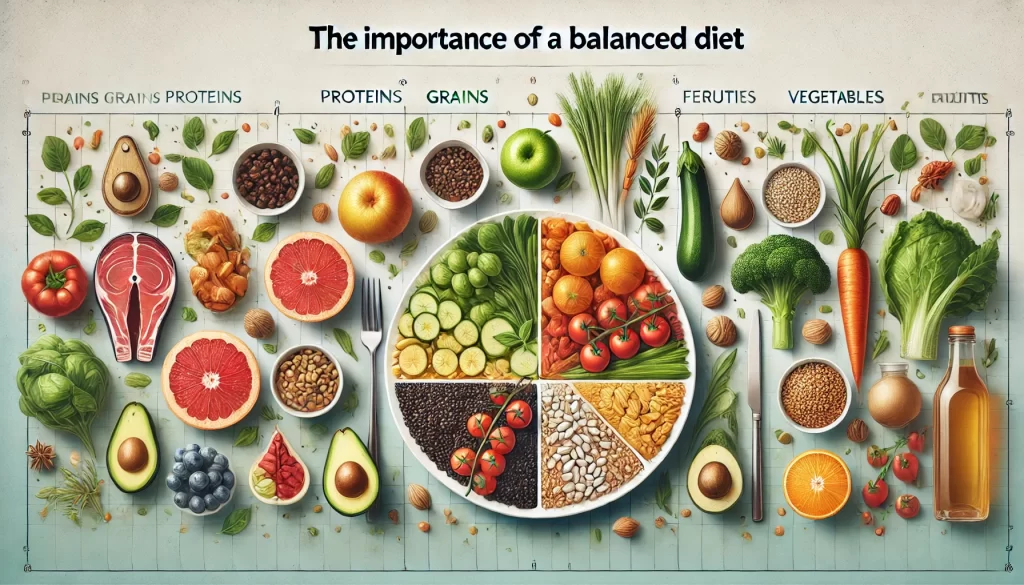The Complete Guide to a Balanced Diet: Essential for a Good Life
Maintaining ideal health and making sure your body gets all the nutrients it needs to operate depend on a balanced diet. It’s not only about consuming enough but also about consuming the correct mix of foods in the proper ratios. We will discuss what a balanced diet is, why it’s crucial, and how to create one fit for your nutritional requirements and way of life in this extensive book.
Definition of a balanced diet
All the vital nutrients—carbohydrates, proteins, fats, vitamins, minerals, and water—in the proper ratios are found in a balanced diet to support general health and well-being. It covers a range of foods from many dietary groups to guarantee the body absorbs all the nutrients it needs.
Elements of a balanced diet
Found in whole grains, fruits, and vegetables, carbohydrates are the main source of energy the body uses.
Found in lean meats, beans, nuts, and dairy products, proteins are vital for both building and healing of tissues.
Necessary for brain function and energy, fats abound from nuts, seeds, olive oil, and fatty fish.
From fruits, vegetables, nuts, and dairy, vitamins and minerals support many body systems.
Found in whole grains, fruits, vegetables, and legumes, fiber aids with digestive health.
Water is essential for hydration and for easing physical activities.

Why should one have a balanced diet?
1. Keeps General Health
A balanced diet supplies the nutrients needed for organ health, immune system function, and energy generation.
2. Prevents Nutritional Deficiencies
Eating a range of foods guarantees enough vital nutrients such as iron, calcium, and vitamin D, thereby lowering your chance of deficits.
3. Promotes Mental Health
Studies reveal a connection between nutrition and mental health; meals high in nutrients lower the incidence of anxiety and despair.
4. aids in weight management.
A balanced diet gives the correct number of calories and nutrients, therefore preventing overindulgence and supporting the maintenance of a healthy weight.
5. lowers chronic disease risk
Eating a range of nutrient-dense foods reduces certain cancer, diabetes, and heart disease risks.
Constructing a Balanced Diet: Strategies
Apply the Food Plate Model.
Apply resources like the USDA’s MyPlate or comparable recommendations, stressing:
Fruits and vegetables account for half the plate.
One-quarter of the plate consists of whole grains.
One-quarter of the plate: lean proteins.
2. Add Diversity of Foods.
Eating many kinds of meals guarantees a variety of nutrients. Within food categories—that is, different fruits, vegetables, and protein sources—rotate your selections.
3. Control of Portions
Keep reasonable portions to prevent overindulging even from eating nutritious foods.
4. Limit Processed Foods
Eat less of foods heavy in sodium, harmful fats, and added sugar.
5. Keep Hydrated.
Limit sweet drinks and sip lots of water. Water helps metabolism, digestion, and energy level control.
Food Groups Found in a Balanced Diet
Fruits and Vegetables
Overflowing in vitamins, minerals, and fiber.
To increase nutrient absorption, try for a rainbow of colors.
The proteins
Add lean meats, fish, eggs, beans, and nuts.
When at all possible, choose plant-based proteins to increase fiber and cut saturated fats.
Grain foods
For more fiber and steady energy, pick whole grains, including brown rice, quinoa, oats, and whole wheat bread.
Dairy or Dairy Alternatives
Calcium and vitamin D sources.
Choose low-fat or plant-based products like soy or almond milk.
Fit Fats
Add sources including olive oil, avocados, nuts, and seeds.
Tips for a Balanced Diet: Practical Advice Plan Your Meals
Plan a weekly meal including every food category.
Meal prep will help you cut undesirable choices and save time.
View Nutrition Labels
Search for additional sugars, harmful fats, and heavy sodium levels.
Eat Smartly for Snacks
Replace processed snacks with nutrient-dense foods, including fruits, almonds, or yogurt.
Pay Attention to Cooking Techniques
Choose baking, steaming, grilling, or stir-frying above frying.
Pay Attention To Your Body
Eat when hungry; quit when you are full.
Particular Issues
Dietary Restrainment
For vegans or vegetarians: emphasize foods supplemented with plant-based proteins.
For those with allergies, seek substitutes for frequent triggers, including gluten, dairy, or nuts.
Age and Activity Levels
Youngsters need diets with increased energy density.
Although they may need fewer calories, adults and older people could need more nutrient density.
Regional and Cultural Food
Add regional cuisine and traditional recipes to make your diet sustainable and pleasurable.
Typical Stories Regarding a Healthy Diet
The first myth is that “carbs are bad for you.”
Truth: Though they should be consumed in moderation, complex carbs are absolutely vital for energy.
My second myth: “Fats make you fat.”
Actually, brain function and energy depend on healthy fats.
Myth 3: “Missing meals aids in weight loss.”
Actually, skipping meals might cause nutrient shortages and overindulgence.
In conclusion
Emphasizing diversity, moderation, and nutrient-dense foods, a balanced diet is not a set menu but rather a flexible method of eating. Choosing foods wisely will help you to enhance your general quality of life, mental health, and physical condition.
Start today with little changes—add extra fruits and vegetables to your meals, substitute whole grains for processed grains, and sip more water. These straightforward actions will gradually help you to significantly enhance your health.
Visit www.tipsclear.com for additional health ideas and information.

